 Richard Zacks was born in Savannah, Georgia, but grew up in New York City. As a teenager, he gambled on the horses, played blackjack in illegal Manhattan card parlors, and bought his first drink at age 15 at the Plaza Hotel. He studied Arabic in Cairo, Italian in Perugia, and French in the vineyards of France. He wrote a syndicated column for four years carried by the NY Daily News, Boston Globe, Dallas Morning News, and many others. He keeps a hole-in-the-wall office in Manhattan. Zacks spent more than three years researching The Pirate Hunter, including months at the Public Record Office in London (where he found a pirate prisoner’s long-lost diary). He is the author of six books of unusual research, including History Laid Bare and perennial book club favorite An Underground Education—he dug up stories about Edison’s electric chair and Lincoln’s tentative plan to ship out the freed slaves. He also authored Island of Vice (about Teddy Roosevelt as NYC police commissioner), Chasing the Last Laugh (about Mark Twain’s round-the-world comedy tour) and The Pirate Coast (about America’s first overseas covert op in 1805).
Richard Zacks was born in Savannah, Georgia, but grew up in New York City. As a teenager, he gambled on the horses, played blackjack in illegal Manhattan card parlors, and bought his first drink at age 15 at the Plaza Hotel. He studied Arabic in Cairo, Italian in Perugia, and French in the vineyards of France. He wrote a syndicated column for four years carried by the NY Daily News, Boston Globe, Dallas Morning News, and many others. He keeps a hole-in-the-wall office in Manhattan. Zacks spent more than three years researching The Pirate Hunter, including months at the Public Record Office in London (where he found a pirate prisoner’s long-lost diary). He is the author of six books of unusual research, including History Laid Bare and perennial book club favorite An Underground Education—he dug up stories about Edison’s electric chair and Lincoln’s tentative plan to ship out the freed slaves. He also authored Island of Vice (about Teddy Roosevelt as NYC police commissioner), Chasing the Last Laugh (about Mark Twain’s round-the-world comedy tour) and The Pirate Coast (about America’s first overseas covert op in 1805).
Describe your writing process—schedule, environment, tactics, and inspirations—and research protocols; how do you choose your subject matter?
My writing process? I usually wait until my self-loathing over procrastinating is so great that it is a choice: write something or change professions. (I was a house painter in college and I really don’t want to go back to that.) I have an office in an old New York building near Union Square Park. I go every day.
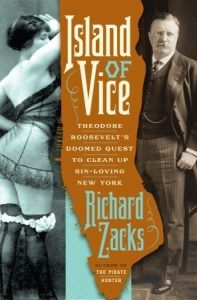 Books come in phases. I love the research. It plays to my voyeuristic/private eye tendencies. I love snooping into lives in the past, reading personal letters, trying to build out entire scenes. Since I was trained as a journalist before becoming a historian, I lean hard towards Who, What, When and Where. I want physical details, so I build elaborate timelines, sometimes 400 pages long… Aug. 22, 1893, Aug. 24, 1894… and then I layer in every detail I can find with its source. Over time, these random details accumulate and a clear picture of many individual days starts to emerge. This format of a giant timeline helps with “plotting” the non-fiction narrative. Yes, it is non-fiction, but writers have huge choices as to structure and I always want to build a plot and suspense, because that’s what I need as a reader to keep me interested.
Books come in phases. I love the research. It plays to my voyeuristic/private eye tendencies. I love snooping into lives in the past, reading personal letters, trying to build out entire scenes. Since I was trained as a journalist before becoming a historian, I lean hard towards Who, What, When and Where. I want physical details, so I build elaborate timelines, sometimes 400 pages long… Aug. 22, 1893, Aug. 24, 1894… and then I layer in every detail I can find with its source. Over time, these random details accumulate and a clear picture of many individual days starts to emerge. This format of a giant timeline helps with “plotting” the non-fiction narrative. Yes, it is non-fiction, but writers have huge choices as to structure and I always want to build a plot and suspense, because that’s what I need as a reader to keep me interested.
Choosing a topic is the hardest part of the process. I have an office crammed with rejected ideas. I want to pick a topic that fascinates me and will also lure a large enough audience. (Pirate Hunter sold more than 200,000 copies.) I have spent far too much time on Casanova and Sir Richard Burton without green-lighting anything. Lately I have done work for Hollywood. I was the historical consultant for The Alienist, Caleb Carr’s great suspense novel in 1890s New York. Two of my books are under option, and I am working with the producers to develop the material, but I need to re-focus on finding a book idea.
I should read non-fiction all day long, but I am reading mostly fiction these days. And then there’s the NYT crossword puzzle.
Walk me through your publishing process—who does what and when, how much input you have throughout, and what marketing you’re expected to do as the author.
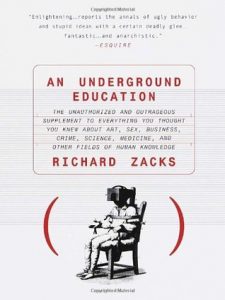 A friend described his publishing process as “the calm before the calm.” Thankfully, I have never experienced that. The PR departments of the various publishers have gotten me piles of radio interviews over the years and bookstores appearances. I LOVE giving my PowerPoints, especially this last one on Twain, since it generated lots of laughs. I never knew how absolutely glorious it feels to make two hundred people laugh. Thank you, St. Louis.
A friend described his publishing process as “the calm before the calm.” Thankfully, I have never experienced that. The PR departments of the various publishers have gotten me piles of radio interviews over the years and bookstores appearances. I LOVE giving my PowerPoints, especially this last one on Twain, since it generated lots of laughs. I never knew how absolutely glorious it feels to make two hundred people laugh. Thank you, St. Louis.
I create my own website, because it’s fun and easy. I should do more on Facebook. I don’t tweet, because I think I would get addicted. Basically: radio, speeches, and the occasional self-promoting op-ed or companion article. I want people to read my book, so promotion is not too painful.
Tell me about your support system online and IRL—who sings loudest your praises and who pats your back?
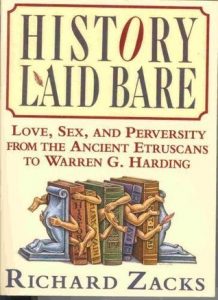 My wife is a literary agent, so she reads the near-final draft. She is brutally honest, after I convince her yet again that I want to be brutally honest. I try not to bother her too much, but she is really good at what she does, and has dozens of paying clients to serve. Reviews have been solidly positive over the years, but I did get a complete slam in one major publication. I was flabbergasted. I complained to the book editor and he asked whether I believed in freedom of the press and of opinions. I said “Sure,” but that he shouldn’t let children play with matches. I also like Ben Franklin’s line about Freedom of the Press being accompanied by Freedom of the Cudgel. Ka-boom.
My wife is a literary agent, so she reads the near-final draft. She is brutally honest, after I convince her yet again that I want to be brutally honest. I try not to bother her too much, but she is really good at what she does, and has dozens of paying clients to serve. Reviews have been solidly positive over the years, but I did get a complete slam in one major publication. I was flabbergasted. I complained to the book editor and he asked whether I believed in freedom of the press and of opinions. I said “Sure,” but that he shouldn’t let children play with matches. I also like Ben Franklin’s line about Freedom of the Press being accompanied by Freedom of the Cudgel. Ka-boom.
Your question was upbeat in tone. I love getting passionate positive emails from strangers. I used to say that was the best part of the publishing process and almost mean it.
In what ways does life influence your art and vice versa; do you harbor such secrets as your subjects?
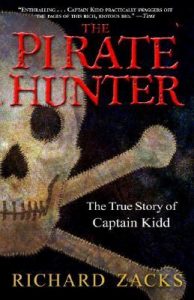 My subjects reflect my personality, which I would describe as subversive, voyeuristic, adventurous, with a solid sense of humor. There is also a Walter Mitty aspect, slipping into the lives of others.
My subjects reflect my personality, which I would describe as subversive, voyeuristic, adventurous, with a solid sense of humor. There is also a Walter Mitty aspect, slipping into the lives of others.
My first book was sex in history; my second book aimed to one-up the experts and deliver contrarian views. Then came my pirate phase. I live a respectable life; who wouldn’t want to be an outlaw, a pirate… at least for a week? Robbing from ships owned by stodgy arrogant nobleman who never worked a day in their lives, drinking rum, dancing to the hornpipe, eating shellfish, shooting cannons. (The older I get, the harder it is to justify.) Then… to go along on a covert op to rescue 300 American hostages in Tripoli… then explore vice in 1890s New York… finally spend a few years with Mark Twain when he was down and out… and very darkly funny.
What do you love most about your creativity?
Life is really swell in the middle of researching a book.
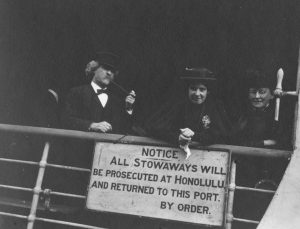
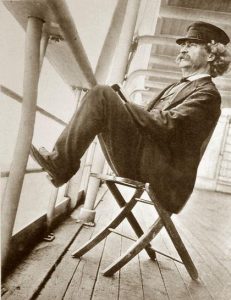
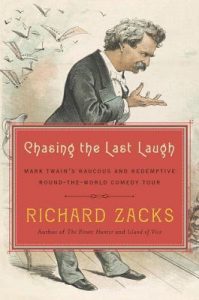 Connect with Richard Zacks:
Connect with Richard Zacks: